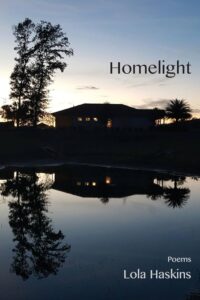Poet Lola Haskins takes the idea of “slant” to a new level
A phrase kept recurring as I read Homelight: Poems, the new collection by poet Lola Haskins. The phrase is “looking slant.”
It has many meanings, like taking or presenting a particular view or approach, or representing a particular political or philosophical position, or understanding something from a particular vantage point.
Applied to these 48 poems (or 60, if you add the grouped poems), “looking slant” is not so much articulating a specific worldview or philosophy but instead casting a very different eye in very different ways. And it sneaks up on you. You think you’re experiencing a poem just like you experienced the one you just read, and then Haskins subtly shifts gears. She has a focused eye for what she writes about, but it’s a focus that changes with each subject and each poem.
It’s not a case of a poet being inconsistent; it’s more a case of a sometimes astonishing and controlled differentiation. You realize that each subject or theme is being examined and explored on its own terms rather than any preconceptions shaping what’s written. It’s a difficult feat to pull off, but Haskins does it, and she does it very well.
This diverse “slant” may reflect a theme in so many of her subjects — the great diversity of the natural world. She writes about the wind, the sea, the sky, and the heavens. The section in Homelight entitled “Wings” includes 10 poems mostly about birds. I say “mostly,” because like so many of the poems here, these are about more than birds.
The Racing Pigeon

a two-day old chick,
warm and pulsing
in my hand, and as
I stroked its beak
I came to wonder
about home, and
whether if I were
abandoned between
deep-set hills that
would neither kill me
nor make me happy.
I would give up
everything
I had
to fly there.
The poems in the opening section, “On the Shoulders of Giants,” are something of a tribute to poets she’s read and likely been influenced by, including William Blake, Rainer Maria Rilke, Mary Oliver, W.S. Merwin, and several others. The poems reflect both a gratitude as well as a “going beyond.” Haskins is not afraid to push her appreciation to a level that becomes her own original voice.

Lola Haskins
In the third section, “And Then They are Gone,” she writes about the biblical concept of dominion — that humans were entrusted with dominion over the earth. The concept implies stewardship rather than domination and exploitation. Similar themes are effectively explored in the collection’s four remaining sections: “(In)humanity,” “Corona 2019-2021,” “The Slapped Girl,” and “Rehearsing.”
Haskins has published 13 collections of poetry and three books of prose. Her poems have been published in numerous literary journals and magazines, and she has received the Iowa Poetry Prize, two fellowships form the National Endowment of the Arts, two Florida Book Awards, narrative poetry prizes from Southern Poetry Review and New England Review, Florida’s Eden Prize for environmental writing, and the Emily Dickinson Prize from the Poetry Society of America.
It’s trite to call a poetry collection original, but that’s what Homelight is. As you read through the collection, each poem is individually striking; you can’t select a favorite. What the poems do, however, is open up different ways to see and understand, and different ways you can see something “slant.”
Photo by Strolicfurlan, Creative Commons, via Flickr. Post by Glynn Young.
How to Read a Poem uses images like the mouse, the hive, the switch (from the Billy Collins poem)—to guide readers into new ways of understanding poems. Anthology included.
“I require all our incoming poetry students—in the MFA I direct—to buy and read this book.”
—Jeanetta Calhoun Mish
- Poets and Poems: Alison Blevins and “Where Will We Live if the House Burns Down?” - July 1, 2025
- Poets and Poems: Paul Pastor and “The Locust Years” - June 26, 2025
- What Happened to the Fireside Poets? - June 24, 2025


Laura Lynn Brown says
This sounds intriguing, including the 10 poems mostly about birds. Thanks for giving us one of them.
Bethany Rohde says
This morning, thanks to Every Day Poems, I got to read Lola Haskins’ piece, “The Salt Marsh.” Such a gorgeous poem. Glad you highlighted her collection here, so I could find out more about her work.